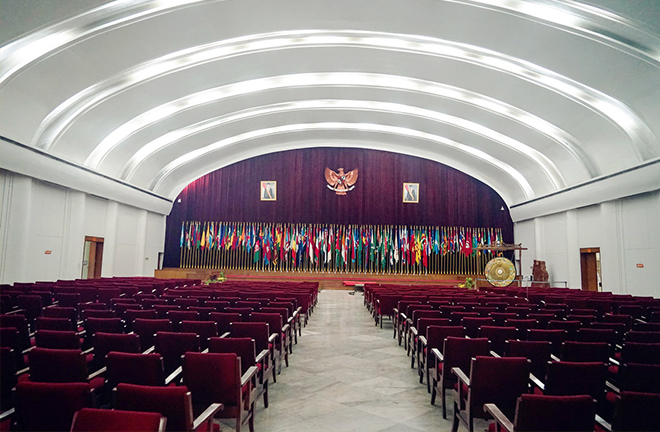Global South expected to play bigger role

Venue of the Bandung Conference, which marked the first time that countries of the Global South united to oppose colonialism in defense of their sovereign rights and a more equitable world Photo: TUCHONG
The term “Global South” has gained traction as the clout of countries in this bloc grows. Centering around the connotations of this concept, CSST recently interviewed Alexandre Ganan de Brites Figueiredo, a visiting professor from the University of São Paulo in Brazil, and Gustavo Alejandro Girado, a professor from the National University of Lanus and the University of Buenos Aires in Argentina.
Distinctive epistemology
The term Global South is constantly used today but there is no homogeneous treatment of the concept. Girado noted that geographically, the term refers to countries that are located below the Equator line (in the southern hemisphere), but some countries which are politically involved in the Global South are physically in the northern hemisphere.
“The term, then, is more of a political concept than an accurate description of the world,” Girado said. “The main value of the term is diplomatic, and in that sense, it seems to have gained strength as a euphemism to replace less acceptable terms these days.”
During the Cold War, countries that were not aligned with either the United States or the Soviet Union were said to belong to the “Third World.” In April 1955, government delegations from 29 Asian and African countries and regions held their own conference in Bandung, Indonesia. “From there, we can see that there is a kind of political connection between both processes, the one that began with the non-aligned ones, and this one now with the Global South,” Girado said.
Figueiredo told CSST that in general terms, the concept of the Global South involves the set of countries that, in one way or another, suffered negatively and violently the impact of colonial and industrial expansion, and today face similar challenges to obtain their economic development, as opposed to the predominance of the epistemology of the Global North.
“It is a heterogeneous and pluricontinental group, but cohesive in the fact that it is composed of States originating from the economic periphery of an international system that concentrates wealth and innovation in the few economies of the ‘North,’” Figueiredo emphasized.
Figueiredo also highlighted the importance to note that there is a relevant qualitative difference compared to previous concepts of “emerging countries” or “developing countries.” “In these two versions, it is always necessary to clarify what is “emerged,” what is “underdevelopment” and, in this sense, the conceptual prevalence is those that are already developed, have already emerged. The idea of the Global South indicates a geopolitical, social, historical, and economic position that has its own epistemology and that must present its own conception of development and independence,” he explained.
Outdated international system
At present, the Global South faces many challenges. Figueiredo pointed out that the consequences of the colonial system and peripheral insertion in the international system left serious marks, with acute social and economic problems. He called on the Global South to devise a consensual agenda that gives materiality to the demands for development, jobs, and peace. To achieve this, a difficult consultation between the countries of the Global South is necessary, one that overcomes local divisions and which can strategically overcome barriers between rich and poor countries.
In Figueiredo’s opinion, international governance is closed, in its effective spaces of power, to the demands of emerging countries. “It is a system that was designed after WWII and hegemonized by the United States. It is extremely urgent to reform the international system that democratizes it, making it more open to all States, without discrimination.”
Girado echoed the same sentiment, saying that the lesser political force of the institutions that was launched after WWII is evident. “This institutionality is breaking down, since the values they contain did not include, when they were created, the values and interests of many countries that today are important and need to be contemplated, almost all of them in the East—China, Japan, Korea, etc.”
China’s role
Citing China as the largest economy in the Global South, Figueiredo affirmed that the country is responsible for a trajectory of overcoming unparalleled adversities. China’s collaboration with the Global South represents a path to overcoming common challenges.
“I highlight that this is due both to the magnitude of the Chinese economy (the main trading partner of many countries in the Global South) and to the orientation of its foreign policy,” Figueiredo said. “China has never, in its long history, been an interventionist power. Furthermore, an analysis of economic history shows that whenever China has prospered, the world has also prospered with it.”
“China’s role is fundamental since it is one of the most dynamic economies in the world whose strength contributes to driving the economic activity of those economies with which it is related,” Girado said. As a large part of the world of the Global South is related to China, and that relationship is very close not only in terms of trade and investment, but also politically, the presence of such an important supplier of goods and technologies, as well as a demander of the largest part of the products that constitute the classic export basket of developing countries, puts China and the relationship—within the Global South—in a privileged place.
“China’s commitment to global goals, in terms of climate change as well as its technological vanguard in green and renewable energies, places the country in an unbeatable place to collaborate and generate a ‘win-win’ relationship with the Global South that suffers from climate change, that suffers the consequences of the indiscriminate use of resources for the sole benefit of the northern hemisphere, and that even suffers the consequences of the reduction of the ozone layer in the south due to the non-compliance in the north with the measures of environmental protection,” Girado concluded.
Edited by CHEN MIRONG

 PRINT
PRINT CLOSE
CLOSE